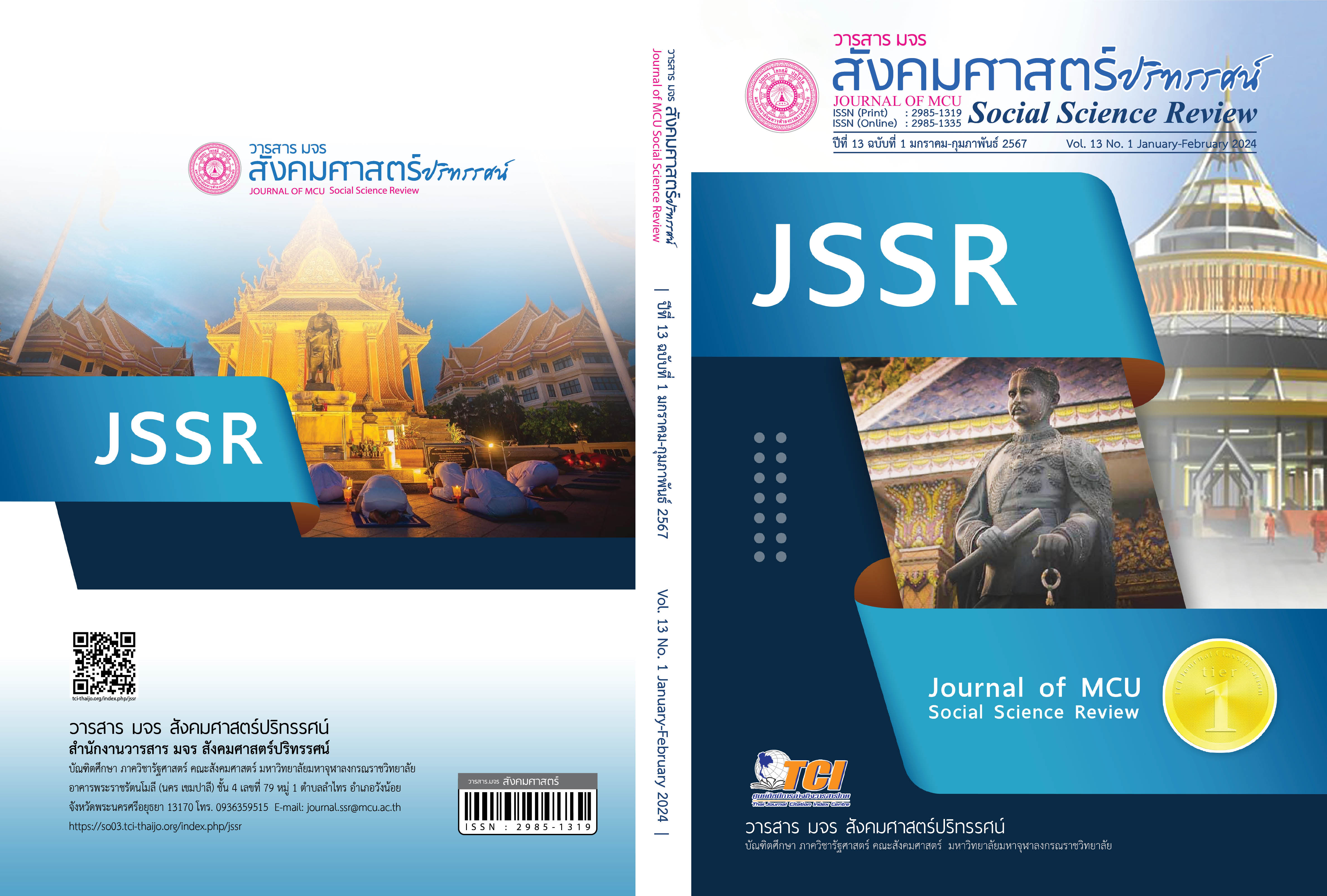ทฤษฎีการเชื่อมโยงความรู้กับการประยุกต์ใช้เมตาเวิร์ส ในระบบการศึกษาไทย
คำสำคัญ:
ทฤษฎีการเชื่อมโยงความรู้, เมตาเวิร์ส, ระบบการศึกษาไทยบทคัดย่อ
บทความวิชาการฉบับนี้เป็นบทความที่วิเคราะห์ถึงทฤษฎีการเชื่อมโยงความรู้กับการเรียนรู้โดยใช้เมตาเวิร์สเป็นเครื่องมือในระบบการศึกษาของไทย การเชื่อมโยงความรู้หรือการเรียนรู้แบบเชื่อมต่อได้นิยามว่าการเรียนรู้สามารถเกิดขึ้นได้ในสภาพแวดล้อมที่มีการประยุกต์ใช้เครื่องมือทางเทคโนโลยี เมื่อผู้เรียนเข้าถึงข้อมูลก็จะมีการเชื่อมโยงความรู้ต่าง ๆ เข้าด้วยกันเมตาเวิร์สเป็นการสร้างสภาพแวดล้อมทางการเรียนรู้ให้เสมือนจริง ช่วยให้ผู้เรียนสามารถเข้าถึงและเชื่อมโยงข้อมูลที่หลากหลาย แม้ในปัจจุบัน ยังไม่มีหลักฐานที่แน่ชัดเกี่ยวกับประสิทธิภาพของการเรียนรู้เสมือนจริงผ่านเมตาเวิร์ส แต่เมตาเวิร์สก็เป็นเครื่องมือในการเพิ่มผลลัพธ์ในการเรียนรู้ได้อย่างมีประสิทธิภาพตามทฤษฎีการเรียนรู้แบบเชื่อมต่อ ระบบการศึกษาในไทยมีแนวโน้มที่จะได้รับประโยชน์อย่างมากจากการนำเมตาเวิร์สมาประยุกต์ใช้เพื่อประโยชน์ในการสร้างการเรียนรู้ แต่ก็ยังมีความท้าทายหลายประการ โดยเฉพาะอย่างยิ่งความพร้อมทางเทคโนโลยีและการเตรียมความพร้อมของครูสำหรับสภาพแวดล้อมการเรียนรู้แบบเสมือนจริง
เอกสารอ้างอิง
Aresta, M., et al. (2011). Social software, learning and education: new ways to look at and work with the classroom. Retrieved March 20, 2020, from https://shorturl.asia/Otgqm
Bandura, A. (2001) Social Cognitive Theory: An Agentic Perspective. Annual Review of Psychology, 52(1), 1–26.
Bennett, N. & Lemoine, J. (2014). What VUCA really means for you. Harvard business review, 92(1/2), 1-7.
Czerkawski, B. & Berti, M. (2021). Learning experience design for augmented reality. Research in Learning Technology, 29, 1-12.
Díaz, J., et al. (2020). Virtual world as a resource for hybrid education. International Journal of Emerging Technologies in Learning (iJET), 15(15), 94-109.
Downes, S. (2005) An introduction to connective knowledge. Retrieved March 20, 2020, from www.downes.ca/cgi-bin/page.cgi?post=33034
Goldie, J. G. S. (2016). Connectivism: A knowledge learning theory for the digital age?. Medical teacher, 38(10), 1064-1069.
Jovanović, A. & Milosavljević, A. (2022). VoRtex Metaverse platform for gamified collaborative learning. Electronics, 11(3), 317-336.
Kemp, J. & Livingstone, D. (2006). Putting a Second Life metaverse skin on learning management systems. CA, San Francisco: The University of Paisley.
Kiatkheeree, P. (2018). Insights into teacher education curriculum in Thailand. Retrieved March 20, 2020, from www.academia.eduTeacher_Education
Lee, H. & Hwang, Y. (2022). Technology-Enhanced Education through VR-Making and Metaverse-Linking to Foster Teacher Readiness and Sustainable Learning. Sustainability, 14(8), 47-86.
Loureiro, A. & Bettencourt, T. (2010). Immersive environments–A connectivist approach. Retrieved March 20, 2020, from https://shorturl.asia/5PeCf
MacCallum, K. & Parsons, D. (2019). Teacher perspectives on mobile augmented reality: The potential of metaverse for learning. Retrieved March 20, 2020, from https://shorturl.asia/KWt1O
Mystakidis, S. (2022). Metaverse. Encyclopedia, 2(1), 486-497.
Phakamach, P., et al. (2022). The Metaverse in education: The future of immersive teaching & learning. RICE Journal of Creative Entrepreneurship and Management, 3(2), 75-88.
Rospigliosi, P. A. (2022a). Adopting the metaverse for learning environments means more use of deep learning artificial intelligence: this presents challenges and problems. Interactive Learning Environments, 30(9), 1573-1576.
_____. (2022b). Metaverse or Simulacra? Roblox, Minecraft, Meta, and the turn to virtual reality for education, socialisation and work. Interactive Learning Environments, 30(1), 1-3.
Siemens, G. (2005). Connectivism: Learning as network-creation. ASTD Learning News, 10(1), 1-28.
Sparkes, M. (2021). What is a metaverse, and why is everyone talking about it?. New Scientist, 251(3348), 18-38.
Tlili, A., et al. (2022). Is Metaverse in education a blessing or a curse: a combined content and bibliometric analysis. Smart Learning Environments, 9(24), 1-31.
Tortermvasana, K. (2022). Partnership unveils education metaverse. Retrieved November 19, 2022, from www.bangkokpost.com/partnership-unveils-educationmetaverse
Widyastari, D. A., et al. (2022). Learning Methods During School Closure and Its Correlation with Anxiety and Health Behavior of Thai Students. Frontiers in pediatrics, 10, 1-13.
Zhong, J., & Zheng, Y. (2022). Empowering future education: Learning in the Edu Metaverse. Discover Artificial Intelligence, 3(1), 1-14.
ดาวน์โหลด
เผยแพร่แล้ว
รูปแบบการอ้างอิง
ฉบับ
ประเภทบทความ
สัญญาอนุญาต
ลิขสิทธิ์ (c) 2024 วารสาร มจร สังคมศาสตร์ปริทรรศน์

อนุญาตภายใต้เงื่อนไข Creative Commons Attribution-NonCommercial-NoDerivatives 4.0 International License.
เพื่อให้เป็นไปตามกฎหมายลิขสิทธิ์ ผู้นิพนธ์ทุกท่านต้องลงลายมือชื่อในแบบฟอร์มใบมอบลิขสิทธิ์บทความให้แก่วารสารฯ พร้อมกับบทความต้นฉบับที่ได้แก้ไขครั้งสุดท้าย นอกจากนี้ ผู้นิพนธ์ทุกท่านต้องยืนยันว่าบทความต้นฉบับที่ส่งมาตีพิมพ์นั้น ได้ส่งมาตีพิมพ์เฉพาะในวารสาร มจร สังคมศาสตร์ปริทรรศน์ เพียงแห่งเดียวเท่านั้น หากมีการใช้ภาพหรือตารางหรือเนื้อหาอื่นๆ ของผู้นิพนธ์อื่นที่ปรากฏในสิ่งตีพิมพ์อื่นมาแล้ว ผู้นิพนธ์ต้องขออนุญาตเจ้าของลิขสิทธิ์ก่อน พร้อมทั้งแสดงหนังสือที่ได้รับการยินยอมต่อบรรณาธิการ ก่อนที่บทความจะได้รับการตีพิมพ์ หากไม่เป็นไปตามข้อกำหนดเบื้องต้น ทางวารสารจะถอดบทความของท่านออกโดยไม่มีข้อยกเว้นใดๆ ทั้งสิ้น





